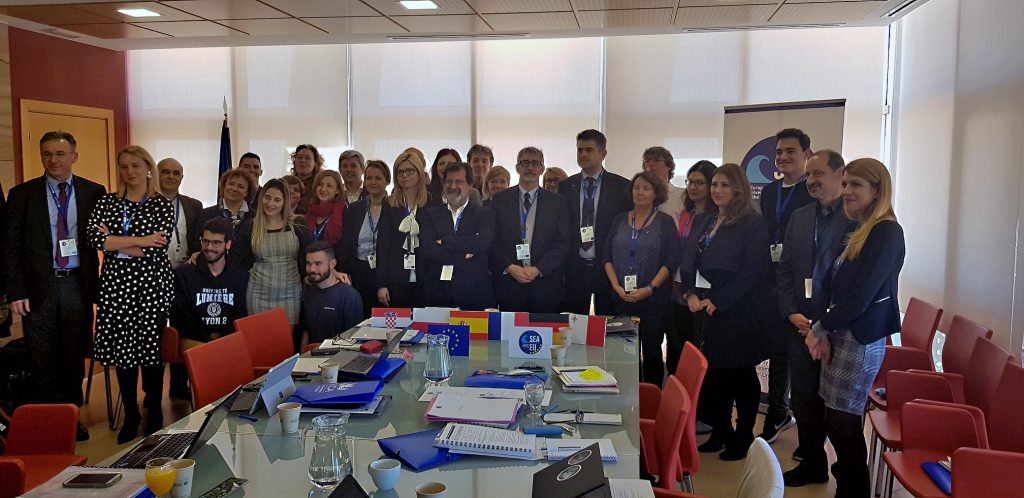Allianza SEA-EU

¿Quiénes somos?
Universidad de Cádiz (España). Coordinadora.
Universidad de Bretaña Occidental en Brest (France)
Universidad de Kiel (Alemania)
Universidad de Gdańsk (Polonia)
Universidad de Split (Croacia)
Universidad de Malta (Malta)
y 32 partners asociados, incluyendo 8 centros de investigación, 5 grandes empresas, 5 ayuntamientos y una diputación provincial, 4 ONG y organizaciones sin ánimo de lucro y 3 campus de excelencia internacional.
Uniendo
• 122.832 estudiantes.
• 28.373 egresados/año.
• 16.909 trabajadores, incluyendo 10.427 miembros del personal académico e investigador.
• 68 facultades y escuelas.
• 117 institutos de investigación
• 3 campus de excelencia internacional
Nuestra visión
Our vision is to establish a distinctly international, pluri-ethnic, multilingual and interdisciplinary European University. This vision is rooted in the high quality and excellence in education and research of the alliance with the intent to strengthen the links between teaching, research, innovation and knowledge transfer. The convergence of media and digitalisation has changed the way we work and live. Change, going forward, will continue to be rapid, in a world of perpetual connectivity. Consequently, traditional training models are being found wanting. Developing both critical-thinking and creativity with students is key. This is our vision as a consortium: to create the conditions in which a student will be able to freely and confidently move between disciplines, languages, countries, sectors. Seamless mobility across borders and academic disciplines will provide a substantial leap in quality, performance, attractiveness and international competitiveness. We will work to make our university alliance a universe of possibilities, in which each student will be free but guided to seek out and develop their own path.
As an alliance, we share an integrated, long-term strategy for education, committed to offer outstanding education and research. SEA-EU will engage in concerted efforts towards building an inclusive, sustainable and resilient future for people and planet, with the specific vocation of dealing with the sea that unites us. In this long-term vision, we are committed to taking a flagship role in the creation of a European Education Area, strengthening European identity and values and securing the international competitiveness of education and research linked to innovation and knowledge transfer. SEA-EU will actively foster an entrepreneurial, ownership-taking, mind-set, supporting green/blue growth and sustainability. We will develop innovative pedagogies and promote the latest digital technologies in order to deliver personalised content, enable knowledge sharing, foster competitive skills and promote open science. This will result in good practices which will, from the start, embed adaptability and a flexible disposition towards different publics and regions in Europe and beyond.
The main thrust and connecting medium of this consortium is the sea. SEA-EU will encourage excellence in research to gain more knowledge and a better understanding and management of the marine environment. It will assist in building the human resources and skills necessary to match the needs of the evolving marine and maritime sectors, now and in the foreseeable future. It will provide and improve tools and techniques to measure and anticipate ocean based and driven impacts. It will build frameworks for more effective ocean governance. And it will empower societies and communities to achieve the Sustainable Development Goals for the oceans.
KEY DELIVERABLES / ACTIVITIES
• Generate new management and operational structures required for the joint governance of SEA-EU.
• Remove academic barriers to credit recognition and develop a protocol for joint SEA-EU programmes at all educational levels, leading to the award of recognised joint degrees, and starting with marine and maritime issues.
• Increase in both virtual/digital and physical mobility across the 6 universities of the Alliance.
• Increase options for teaching study-units and courses offered in the English language and at least in one other (non-native) language across the SEA-EU community.
• Craft and approve a longer-term, joint strategy for education and training with links to research and innovation, and to society.
